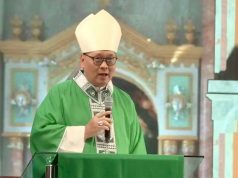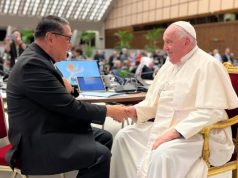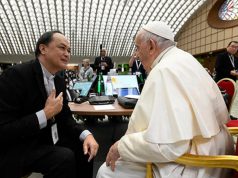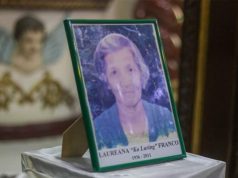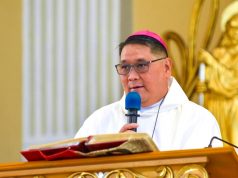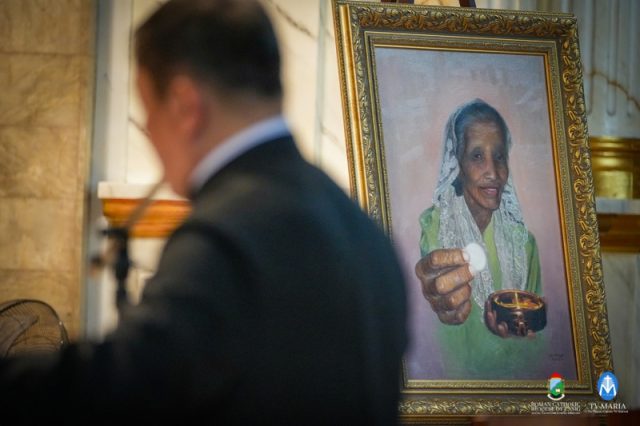
Bishop Mylo Hubert Vergara of Pasig formally opened the diocesan inquiry for the cause for sainthood of the late catechist Laureana “Ka Luring” Franco on Wednesday, Aug. 21, recalling how she had influenced him as a young priest to live a life of holiness.
Vergara led the Mass for the opening of Franco’s cause in her home city of Taguig, over a month after the “nihil obstat” granted by the Vatican’s Dicastery for the Causes of Saints that gave her the title “Servant of God.”
“Sa totoo lang, mabibilang ng ating sampung daliri ang mga diyosesis sa Pilipinas na nagpapadala sa Roma ng mga pangalan para ihanay sa proseso ng pagiging santo o santa. Kaya napakapalad natin dahil mayroon na tayong Servant of God sa katauhan ng isang mabuti at banal na katekista— si ‘Ka Luring,’” Vergara said in his homily during the Mass at the Archdiocesan Shrine of St. Anne in Taguig.
(In fact, we can count on our 10 fingers the dioceses in the Philippines that have submitted names to Rome for the process of becoming a saint. So we are very blessed because we now have a Servant of God in the person of a good and holy catechist— “Ka Luring.”)
Franco, who died after battling cancer in 2011, had served as a volunteer catechist beginning in the late 1960s, and whose reputation for holiness and simplicity was known to then Manila archbishop Jaime Cardinal Sin, who gave her the Pro Ecclesia et Pontifice award on behalf of Pope St. John Paul II in 1990.
Vergara recalled how he had worked with Franco and how she had inspired his own priestly ministry.
He said that as seminary formator at the Holy Apostles Senior Seminary from 1991 to 2001, he led Mass at Franco’s parish, St. Michael the Archangel, in Hagonoy, Taguig.
“I saw in her humility, diligence in serving as a catechist, and a practice of poverty that is full of trust in God in her ministry. I think it was part of God’s big plan that I was appointed bishop of the Diocese of Pasig in 2011 and became the main celebrant of Ka Luring’s funeral Mass,” he said in Filipino.
“I never thought that I would also be the one to promote the diocesan inquiry process of her cause for beatification and canonization. We were not only brought together by fate, God brought us together to walk further onto the path of holiness,” he added.
Vergara noted that the opening of Franco’s cause coincided with the anniversary of the assassination of former senator Benigno “Ninoy” Aquino Jr., and said that the Church also has its own “heroes of the faith” – the saints and the blessed.
Citing Pope Francis’ 2018 letter “Gaudete et Exultate,” the pontiff’s third apostolic exhortation that discussed holiness in the modern world, Vergara said holiness is being true to one’s mission in life and is not only for bishops, priests, and the religious.
“For example: if you are loyal to your wife and you did not become unfaithful, you are holy! If you serve the government and you are not corrupt, you are holy! If you are a grandfather or grandmother and you have a lot of patience, you are holy! If you are a worker or laborer and you are not always late for your work, you are holy! If you are a student and you are serious about finishing your studies, you are holy! Holiness is faithfulness. That’s why we can say you are holy and a hero!”
Franco’s cause is now at the diocesan process, during which testimony and documentation about the life and virtues of a Servant of God are gathered. A cause may begin five years after the death of a person being proposed for sainthood.
If the bishop finds a demonstration of “heroic virtues” based on the judgment of the diocesan tribunal, the cause goes to the Dicastery for the Causes of Saints where a positio, a documentation of the Servant of God’s life and virtues, is prepared and then voted upon by a theological commission and members of the dicastery.
An affirmative vote results in a recommendation to the pope to recognize the candidate’s heroic virtues by decree. If the pontiff agrees, the candidate is bestowed the title “venerable.”
The approval of one miracle as evidence of the Venerable’s intercession merits beatification, upon which the candidate is raised to the altars of the local church. The miracle must be verified by a scientific commission as having no natural explanation. A separate theological commission also investigates whether the miracle can be attributed to the intercession of the candidate.
Canonization requires the approval of a second miracle, also following separate scientific and theological inquiries. Considered an infallible act by the pope, canonization means the person may be publicly venerated throughout the universal Church.





